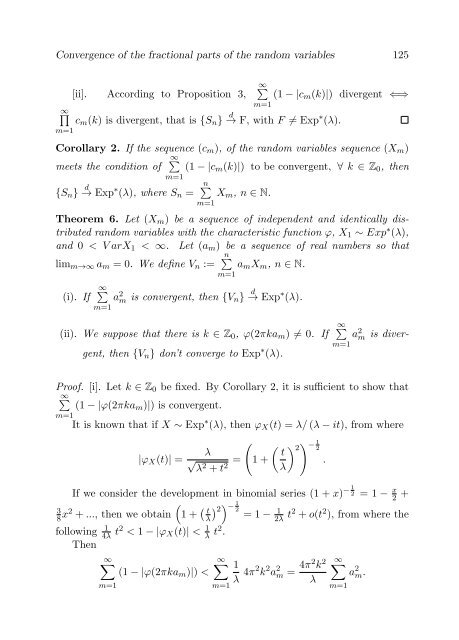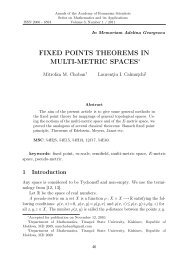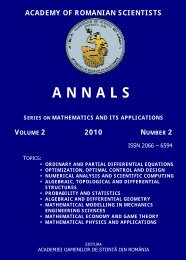convergence of the fractional parts of the random variables to the ...
convergence of the fractional parts of the random variables to the ...
convergence of the fractional parts of the random variables to the ...
Create successful ePaper yourself
Turn your PDF publications into a flip-book with our unique Google optimized e-Paper software.
Convergence <strong>of</strong> <strong>the</strong> <strong>fractional</strong> <strong>parts</strong> <strong>of</strong> <strong>the</strong> <strong>random</strong> <strong>variables</strong> 125<br />
∞∏<br />
m=1<br />
[ii]. According <strong>to</strong> Proposition 3,<br />
∞∑<br />
m=1<br />
(1 − |c m (k)|) divergent ⇐⇒<br />
c m (k) is divergent, that is {S n } d → F, with F ≠ Exp ∗ (λ).<br />
Corollary 2. If <strong>the</strong> sequence (c m ), <strong>of</strong> <strong>the</strong> <strong>random</strong> <strong>variables</strong> sequence (X m )<br />
∞∑<br />
meets <strong>the</strong> condition <strong>of</strong> (1 − |c m (k)|) <strong>to</strong> be convergent, ∀ k ∈ Z 0 , <strong>the</strong>n<br />
m=1<br />
{S n } d → Exp ∗ (λ), where S n = n ∑<br />
m=1<br />
X m , n ∈ N.<br />
Theorem 6. Let (X m ) be a sequence <strong>of</strong> independent and identically distributed<br />
<strong>random</strong> <strong>variables</strong> with <strong>the</strong> characteristic function ϕ, X 1 ∼ Exp ∗ (λ),<br />
and 0 < V arX 1 < ∞. Let (a m ) be a sequence <strong>of</strong> real numbers so that<br />
lim m→∞ a m = 0. We define V n :=<br />
(i). If<br />
∞∑<br />
m=1<br />
n ∑<br />
m=1<br />
a m X m , n ∈ N.<br />
a 2 m is convergent, <strong>the</strong>n {V n } d → Exp ∗ (λ).<br />
(ii). We suppose that <strong>the</strong>re is k ∈ Z 0 , ϕ(2πka m ) ≠ 0. If<br />
a 2 m is divergent,<br />
<strong>the</strong>n {V n } don’t converge <strong>to</strong> Exp ∗ (λ).<br />
∞∑<br />
m=1<br />
Pro<strong>of</strong>. [i]. Let k ∈ Z 0 be fixed. By Corollary 2, it is sufficient <strong>to</strong> show that<br />
∞∑<br />
(1 − |ϕ(2πka m )|) is convergent.<br />
m=1<br />
It is known that if X ∼ Exp ∗ (λ), <strong>the</strong>n ϕ X (t) = λ/ (λ − it), from where<br />
|ϕ X (t)| =<br />
( )<br />
λ<br />
t 2 −<br />
1<br />
2<br />
√<br />
(1<br />
λ 2 + t = +<br />
.<br />
λ) 2<br />
If we consider <strong>the</strong> development in binomial series (1 + x) − 1 2 = 1 − x 2<br />
(<br />
+<br />
3<br />
8 x2 + ..., <strong>the</strong>n we obtain 1 + ( ) )<br />
t 2 −<br />
1<br />
2<br />
λ<br />
= 1 − 1<br />
2λ t2 + o(t 2 ), from where <strong>the</strong><br />
following 1<br />
4λ t2 < 1 − |ϕ X (t)| < 1 λ t2 .<br />
Then<br />
∞∑<br />
∞∑ 1<br />
(1 − |ϕ(2πka m )|) <<br />
λ 4π2 k 2 a 2 m = 4π2 k 2 ∞∑<br />
a 2<br />
λ<br />
m.<br />
m=1<br />
m=1<br />
m=1






